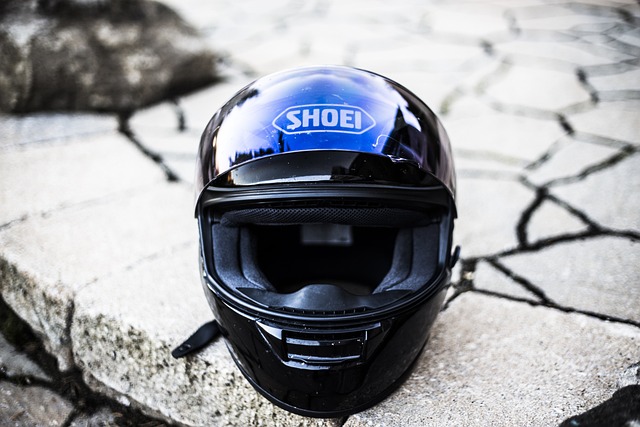
Navigating Colorado’s Motorcycle Helmet Law: A Comprehensive Guide
Immersing oneself in the labyrinth of Colorado’s motorcycle helmet law is an integral aspect of a motorcyclist’s existence, serving as a bulwark against discord and potential juridical proceedings. This legal instrument is intricately articulated to oversee the utilization of protective headgear within the confines of this Centennial State. The decree espouses rigid guidelines about safety equipment standards, underscoring the significance of helmet donning aimed at shielding riders from significant harm.
The spectrum of Colorado’s motorcycle helmet law extends beyond mere safety attire; it also shines light on the stipulations defining which helmets are considered safe for use. It’s incumbent upon these helmets to align with criteria set forth by either American National Standards Institute (ANSI) or Federal Motor Vehicle Safety Standard No. 218 (FMVSS 218). To guarantee paramount safety and compliance, those considering buying a helmet are encouraged to scrutinize labels and indicators meticulously since adherence to these vital regulations forms the underpinning structure of helmet legislation within this jurisdiction.
- The law mandates that all helmets must meet the safety standards set by ANSI or FMVSS 218. These stringent guidelines ensure that the helmet can withstand high-impact forces and protect the rider’s head in case of an accident.
- Colorado’s motorcycle helmet law is inclusive of riders under the age of 18, necessitating them to wear a protective helmet at all times while riding. Failure to comply with this mandate may result in penalties and fines.
- It is also essential for helmets to be equipped with a sticker indicating their compliance with safety standards. This label serves as proof that the helmet has undergone rigorous testing and meets or exceeds federal safety regulations.
- Helmets must feature sturdy chin straps secured by solid rivets, ensuring they remain firmly attached even during high-speed rides or collisions.
- The legislation also stipulates that helmets should not exhibit any signs of damage such as cracks or dents which could compromise their structural integrity and protective capability.
Furthermore, understanding Colorado’s motorcycle helmet laws goes beyond just knowing what type of gear you need; it involves being aware of your rights as a motorcyclist too.
- Motorcyclists have the right to challenge any citation received based on non-compliance with these laws in court if they believe it was unjustly issued.
- Riders are entitled to replace damaged helmets without facing legal repercussions provided they do so within reasonable time frames post-damage detection.
In conclusion, comprehension and adherence to Colorado’s motorcycle helmet laws play an instrumental role in safeguarding riders from potential harm. By following these regulations meticulously, motorcyclists can enjoy safer rides while staying within legal boundaries.
The Importance of Helmet Usage for Motorcyclists
Without a shadow of doubt, helmets stand as an essential shield for those who choose the path of motorcycling. They play a pivotal role in curbing the severity of injuries or preventing fatalities during unfortunate motorcycle mishaps. Crafted meticulously, these protective casings envelop the rider’s cranial region and act as shock absorbers upon collision, thus averting any catastrophic damage to the brain tissue. It follows then that donning a helmet while astride your two-wheeler is not just an intelligent health and safety measure but often forms part of legislative mandates across numerous territories.
However, responding to inquiries such as “Does riding bare-headed on a motorcycle in Colorado cross legal boundaries?” necessitates comprehensive knowledge regarding specific state regulations. Riders should make it their mission to become well-versed with their respective state’s legal decrees in order to uphold them faithfully. Besides being anchored in safety concerns, adherence to helmet laws can also steer clear from undesirable legal entanglements which may include penalties, financial impositions or even revocation of biking rights. Therefore remaining conversant with local rules proves equally critical as maintaining unwavering focus on one’s personal safety whilst cruising along.
Unpacking the Legal Requirements for Helmets on Two Wheels
As one navigates the labyrinth of legislation regarding helmet usage while piloting a motorcycle, it becomes apparent that these laws are not uniform across the United States. When confronted with questions like “Is Colorado demanding helmets for bikers?” The response is intricately layered. In Colorado’s legal landscape, motorcyclists and their passengers who have yet to reach their 18th year of life must don a helmet when they venture onto the open expanse of roadways. This mandate has its roots in an earnest endeavor to safeguard young riders who are statistically more likely to be embroiled in roadside mishaps and consequent injuries.
Yet, for those riders who have crossed into adulthood by attaining 18 years or more, there exists no stipulation within Colorado law necessitating helmet use; although safety proponents and law enforcement entities fervently endorse this measure. Despite lacking explicit legislative backing, Colorado adopts an unambiguous posture on the lifesaving potential of helmets—encouraging all riders to integrate this defense mechanism voluntarily irrespective of any legislative voids. While some might find themselves confounded amidst such ambiguous regulations concerning helmets, veteran motorcyclists perceive clearly that safety ought to supersede any absence of official edicts.
Interpreting the State’s Helmet Law for Bikers

In an era of constant flux, it’s not surprising to find motorcycle laws undergoing considerable alterations in numerous states. Colorado, unsurprisingly, is part of this wave of change. This prompts a question that swirls with uncertainty: “What exactly has changed in the motorcycle law in Colorado?” To distill the essence from the confusion – it’s all about helmets.
The law now asserts that motorcyclists and their passengers who are 17 years or younger must don helmets while riding. A stark contrast emerges for those crossing into adulthood at 18 years – they are not compelled by law to wear a helmet but doing so would be a wise decision for safety reasons.
Yet amidst this whirlwind of change, one should be aware that despite adult riders’ freedom on helmet usage, there exists an unyielding stipulation within Colorado’s legal framework mandating eye protection for every rider and passenger on roadways. The forms can vary between goggles or glasses with protective lenses to helmets equipped with face shields unless your motorcycle sports a transparent windscreen.
This underlines the state’s unwavering dedication towards safeguarding motorcyclists against unforeseen road hazards and advocating rider safety. Therefore when deciphering the perplexities surrounding Colorado’s helmet law for bikers, it becomes paramount to grasp the broader picture which includes requirements around eye protection.
The Impact of Helmet Laws on Motorcycle Safety in the State
The complex web of motorcycle safety stretches far beyond mere understanding of Colorado’s motorbike riding regulations. Complying with helmet laws in the state stands as a critical pillar, not only for safeguarding a rider’s physical integrity but also for upholding compliance with such crucial mandates. The reverberations of these helmet edicts on motorcycling safety are indeed profound, transcending individual defense and sculpting broader traffic well-being benchmarks.
Data culled from accident chronicles and traffic scrutinies consistently paint an unambiguous link between rigorous enforcement of helmet directives and a downturn in biker fatalities and injuries. For example, in Colorado – where helmets’ usage is not universally decreed for bikers and their pillion riders – we witness an unsettlingly high incidence rate of cranial damages stemming from bike-related mishaps vis-a-vis states that enforce universal helmet dictates. It thus becomes evident that it isn’t just about mastering the precepts to ride a motorcycle in Colorado; it extends to grasping the criticality of personal protective gear towards rider security.
The Legal Consequences of Non-compliance with Helmet Laws
At various junctions, defiance of helmet regulations in the Centennial State can initiate a cascade of legal fallout. This backlash often materializes as pecuniary penalties, potential incarceration, and a blemished vehicular history. Each repercussion carries its own ripple effect, impacting not only the immediate circumstances of the offender but also casting long-term shadows on their existence.
Adding to this complexity is the fact that repeat infractions may trigger escalated legal responses. This underscores the criticality of compliance with helmet mandates for motorcyclists.
Moreover, these punitive measures are more than mere sanctions; they play an essential role in underlining the importance of headgear usage among motorbike riders. As road mishap statistics involving two-wheelers rise alarmingly, such laws aim to shield individuals while concurrently mitigating societal expenses arising from these incidents. Hence comprehending and abiding by helmet legislation straddles both realms – legal compulsion and tools for securing personal well-being alongside communal harmony within the bounds of Centennial State.
Examining Court Cases Related to Helmet Laws
In the unfolding narrative of years past, manifold legal battles have etched pivotal markings on the modern understanding of helmet regulations within the Centennial State’s confines. One intriguing case pivoted on deciphering terms such as “motor vehicle operator” and “occupant”, inciting intellectual wrestling matches over their precise definition and consequent implications for headgear usage amongst two-wheel enthusiasts.
Those dissenting against these laws mounted arguments that this nebulous language brewed a climate ripe for subjective enforcement, hence necessitating an injection of clarity into the wording.
A different milestone case orbited around discussions concerning penalty severity when flouting helmet mandates. Advocates championing stricter measures harbored convictions that hefty penalties would function as potent deterrents; thus fuelling a decline in motorbike-related mishaps and mortalities. Conversely, naysayers disputed any approach leaning towards excessive punishment, advocating instead for directing efforts towards education and awareness initiatives to churn out more beneficial, enduring outcomes.
These courtroom dramas sketch out a labyrinthine legal topography surrounding helmet legislation, showcasing diverse viewpoints that persistently shape ongoing legislative discourse.
FAQ
In the Centennial State, a directive stipulates that each individual on a motorcycle, whether driving or riding as a passenger, must don protective headgear conforming to safety standards set forth by the Department of Transportation.
The utilization of helmets considerably lowers susceptibility to severe cranial injuries and death when an unfortunate event like a bike accident occurs. Numerous researches indicate that helmet use can decrease mortality risk by nearly 40% and major brain injury risk by approximately 70%.
Helmet laws differ across states. Commonly, they need DOT approval which signifies their compliance with or exceeding of transportation department’s safety criteria. Some regions have age-specific helmet laws while others necessitate all riders to wear them.
The task of interpreting the state’s biker helmet law generally falls upon law enforcement agencies and judicial bodies. It usually involves assessing if a rider’s helmet adheres to safety norms and was being worn correctly during traffic check-ups or accidents.
Helmet mandates significantly contribute towards enhancing motorcycle security measures. States enforcing stringent helmet rules tend to witness fewer casualties or injuries related to biking mishaps. Helmets are thus regarded as one of most effective defense gear available for bikers.
Those who defy headgear directives likely face monetary penalties which might also impact any subsequent court proceedings related thereto. Certain states may even increase insurance premiums for those found guilty of not wearing helmets during accidents thereby impacting liability determinations.
Court proceedings linked to helmet regulations often deal with their legality or disputes arising from accidents involving non-helmeted riders. The decisions in these cases frequently shape the evolution of such regulations and how they are enforced.

